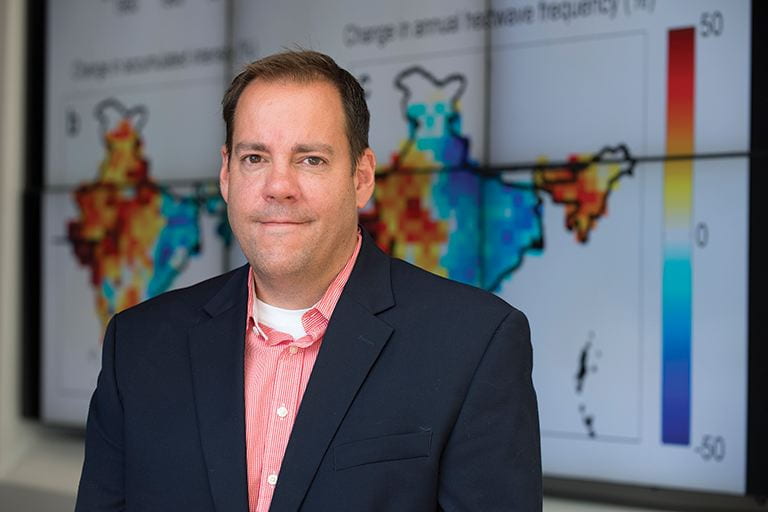UCI scientists make leap forward for genetic sequencing
Research to lead to improved personalized medicine and understanding of evolution

Irvine, Calif., March 11, 2022 — In a paper published today in Sciences Advances, researchers in the Department of Chemistry and the Department of Physics & Astronomy at the University of California, Irvine revealed new details about a key enzyme that makes DNA sequencing possible. The finding is a leap forward into the era of personalized medicine when doctors will be able to design treatments based on the genomes of individual patients.
“Enzymes make life possible by catalyzing chemical transformations that otherwise would just take too long for an organism,” said Greg Weiss, UCI professor of chemistry and a co-corresponding author of the new study. “One of the transformations we’re really interested in is essential for all life on the planet – it’s the process by which DNA is copied and repaired.”
The molecule the UCI-led team studied is an enzyme called Taq, a name derived from the microorganism it was first discovered in, Thermos aquaticus. The molecule the UCI-led team studied is an enzyme called Taq, a name derived from the microorganism it was first discovered in, Thermos aquaticus. Taq replicates DNA. Polymerase chain reaction, the technique with thousands of uses from forensics to PCR tests to detect COVID-19, takes advantage of Taq.
The UCI-led team found that Taq, as it helps make new copies of DNA, behaves completely unlike what scientists previously thought. Instead of behaving like a well-oiled, efficient machine continuously churning out DNA copies, the enzyme, Weiss explained, acts like an indiscriminate shopper who cruises the aisles of a store, throwing everything they see into the shopping cart.
“Instead of carefully selecting each piece to add to the DNA chain, the enzyme grabs dozens of misfits for each piece added successfully,” said Weiss. “Like a shopper checking items off a shopping list, the enzyme tests each part against the DNA sequence it’s trying to replicate.”
It’s well-known that Taq rejects any wrong items that land into its proverbial shopping cart – that rejection is the key, after all, to successfully duplicating a DNA sequence. What’s surprising in the new work is just how frequently Taq rejects correct bases. “It’s the equivalent of a shopper grabbing half a dozen identical cans of tomatoes, putting them in the cart, and testing all of them when only one can is needed.”
The take-home message: Taq is much, much less efficient at doing its job than it could be.
The find is a leap toward revolutionizing medical care, explained Philip Collins, a professor in the UCI Department of Physics & Astronomy who’s a co-corresponding author of the new research. That’s because if scientists understand how Taq functions, then they can better understand just how accurate a person’s sequenced genome truly is.
“Every single person has a slightly different genome,” said Collins, “with different mutations in different places. Some of those are responsible for diseases, and others are responsible for absolutely nothing. To really get at whether these differences are important or healthcare – for properly prescribing medicines – you need to know the differences accurately.”
“Scientists don’t know how these enzymes achieve their accuracy,” said Collins, whose lab created the nano-scale devices for studying Taq’s behavior. “How do you guarantee to a patient that you’ve accurately sequenced their DNA when it’s different from the accepted human genome? Does the patient really have a rare mutation,” asks Collins, “or did the enzyme simply make a mistake?”
“This work could be used to develop improved versions of Taq that waste less time while making copies of DNA,” Weiss said.
The impacts of the work don’t stop at medicine; every scientific field that relies on accurate DNA sequencing stands to benefit from a better understanding of how Taq works. In interpreting evolutionary histories using ancient DNA, for example, scientists rely on assumptions about how DNA changes over time, and those assumptions rely on accurate genetic sequencing.
“We’ve entered the century of genomic data,” said Collins. “At the beginning of the century we unraveled the human genome for the very first time, and we’re starting to understand organisms and species and human history with this newfound information from genomics, but that genomic information is only useful if it’s accurate.”
Co-authors on this study include Mackenzie Turvey, Ph.D., a former UCI graduate student in physics & astronomy, and Kristin Gabriel, Ph.D., a former UCI graduate student in molecular biology & biochemistry. This research was funded by the National Human Genome Research Institute of the NIH.
About the University of California, Irvine: Founded in 1965, UCI is the youngest member of the prestigious Association of American Universities and is ranked among the nation’s top 10 public universities by U.S. News & World Report. The campus has produced five Nobel laureates and is known for its academic achievement, premier research, innovation and anteater mascot. Led by Chancellor Howard Gillman, UCI has more than 36,000 students and offers 224 degree programs. It’s located in one of the world’s safest and most economically vibrant communities and is Orange County’s largest employer, contributing $7 billion annually to the local economy and $8 billion statewide. For more on UCI, visit www.uci.edu.
Media access: Radio programs/stations may, for a fee, use an on-campus ISDN line to interview UCI faculty and experts, subject to availability and university approval. For more UCI news, visit news.uci.edu. Additional resources for journalists may be found at communications.uci.edu/for-journalists.
About the UCI’s Brilliant Future campaign: Publicly launched on October 4, 2019, the Brilliant Future campaign aims to raise awareness and support for UCI. By engaging 75,000 alumni and garnering $2 billion in philanthropic investment, UCI seeks to reach new heights of excellence in student success, health and wellness, research and more. The School of Physical Sciences plays a vital role in the success of the campaign. Learn more by visiting: https://brilliantfuture.uci.edu/uci-school-of-physical-sciences/.


